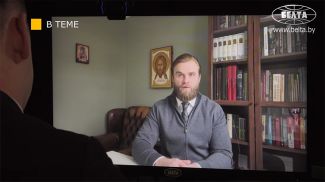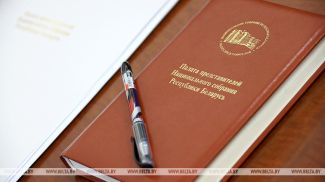MINSK, 18 March (BelTA) – The conclusion of the Peace of Riga is a tragic event in the history of Belarus, Director of the Institute of History at the National Academy of Sciences of Belarus, Candidate of History Vadim Lakiza said at a meeting of BelTA's Expert Community project. The meeting discussed the impact and consequences of the Peace of Riga for Belarusian people.
“A hundred years have passed since the Peace of Riga was signed. We, historians, politicians, public figures, have gathered to assess this event today,” Vadim Lakiza said. “Belarus has experienced all kinds of various events throughout its history, but this event is tragic as it led to many years of division of people and occupation of the territory, therefore we must talk about it,” the scientist added.
The Institute of History of the National Academy of Sciences of Belarus together with the Academy of Public Administration under the aegis of the President of the Republic of Belarus is holding an international conference “Peace of Riga 1921 in the Fate of the Belarusian People (to mark the 100th anniversary of the document)” on 18-19 March. “It is very important that the conference will bring together the leading historians of our country. There will not be a wide foreign representation because of the pandemic, but there will be a historian from Uzbekistan who will present his vision of this event. We will discuss the Peace of Riga and its impact on the history of Belarusian people and the Belarusian statehood. Belarusian and foreign historians will give a general assessment of these developments. We will adopt a resolution that will be available for the broad public,” Vadim Lakiza said.
According to him, it is important that the Academy of Public Administration students who are engaged in research activities will take part in the forum. “Graduates of the Academy of Public Administration will be among the country's decision-makers in the future. Therefore, one of the tasks of the conference is to improve communication between the academic and university communities in the field of social sciences and humanities. The conference will run for two days. I think that the discussion will not get too emotional. Many questions will be raised and revisited based on national interests,” he emphasized.
Vadim Lakiza added that an international conference to discuss this momentous event will be held at the Faculty of History of Belarusian State University on 26 March. A round table on the same topic will be held on at Yanka Kupala State University of Grodno on 29 March, and at the Academy of Public Administration on 30 March.













